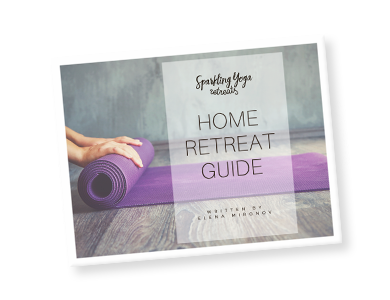Physical strength will get you to the start line. But mental strength will get you to the finish line
UnknownMental Strength VS Physical Strength. 5 Strategies to Cultivate the Power of Your Mind
We often think that strength is measured in how much one can lift or how far we can run. One of the first things we associate the words endurance and stamina with, is physical effort. The question that I often ponder about is what is physical strength and stamina without the mental power?
In many cultures there is an understanding of how important physical training is and how much it impacts the long term health of our bodies. It is indeed an important aspect of health and sanity, and besides the obvious benefits of keeping us fit, the physical activity also helps body produce the feel-good chemicals and support immunity. Yoga asana takes it to the next level by offering a system of postures and movement where we integrate mindful breathing to refine how we serve our musculoskeletal system, nervous system, cardiovascular and respiratory system, helping bodies heal, re-balance on every level as well as gain flexibility and strength.
What is emphasised less is the benefits of both yoga practice as well as mental "workouts" on our brains and our minds. What is mental power after all, and why is it important?
I see mental power as stamina to continue our constructive efforts when things get tough. It's that confidence that we can handle every challenge and hardship including completely new situations that life throws at us when we least expect it.
The question is: do we surrender to the unknown or to the situations that compromise our self-esteem, or do we get up and start cleaning up the mess, one step at a time, systematically and with a sober mind? Do we lose our faith in what we are capable of when life challenges us, or do the toughest situations help us discover mental resources that we didn't know we had?
It is a common belief that our mental states as well as our emotions are beyond our control, and they just happen and change like the weather, influenced by the external circumstances. It is a convenient idea to subscribe to in order to release our responsibility for how we feel at any given time, however we forget that minds and brains are in many ways alike a muscle in how both can be trained. You can learn to re-focus your attention and your mind on what is really important, and let go of the destructive patterns. You can even re-model your neuronal pathways by systematically changing your thinking and behaviour. You can re-claim your inner power again and again, no matter how much life challenges you, just like you can continue to get up on your feel no matter how many times you fall.
All it takes is a few minutes of focusing on a better feeling thought. And a few lifestyle strategies..
Here is what I would like to suggest as my top 5 strategies for cultivating mind power.
1. Quality sleep, regular mindful exercise + excellent nutrition
It sounds easy, but we should perhaps have a post dedicated to just this?
To put it in a nutshell, for your mind to be strong, you need to feed it the right fuel (in my case, I consult a nutritionist/naturopath in order to test my body's levels of vitamins, minerals, essential fatty acids and micronutrients and adapt my diet accordingly to respect the changing needs of my body and brain). For quality rest I do my best to get both the hours and the quality of sleep on a daily basis, and add yoga nidra meditation to my practice to boost the sleep-induced chemicals in the body and give the brain a possibility to re-charge in-depth. For regular mindful exercise, I use yoga and hiking. The added benefit of physical yoga practice is that is also teaches to tolerate discomfort which is another component of cultivating mental power.
2. Using your mental energy wisely
What I mean by that is being intentional about whether you choose to think and talk about things that are draining you or shifting you into the negative state (including mulling over the sad stories, or what someone said or did, indulging in gossip) OR to choose more productive and positive thoughts that are actually going to encourage your growth and evolution. Again, this skill of using your mental energy wisely comes with practice, so the more intentional you get and the more aware you become of what you are spending your mental energy on, the sooner you will experience the liberating feeling of being the master of your mind.
3. Becoming aware of your core beliefs and values
Our core beliefs and values develop throughout our lives and are largely based on our past experiences, successes and failures. They influence our thoughts, behaviour and emotions. They are in fact a part of an evolutionary mechanism that helps us prevent being hurt again if we have been hurt before. But often they become unreasonable and inaccurate, and prevent us not only from being hurt, but also from acquiring new life experiences and having an open mind.
It may help to sit down with yourself and identify some of the core beliefs and values. Look for things that you are categorical about (they often feature words like "always" and "never", for example, "I'll never be strong enough to handle my dream job"). If you manage to identify and modify your core beliefs and values, you will not only conquer your mental limitations, but may be able to change the course of your life.
4. Meditation
Meditation is essentially a practice of mental clarity, calm, creating inner space and learning to focus. All of these are components of mental strength, and using meditation as a brain exercise is alike going to a gym or yoga to strengthen your physical body, and it works extraordinary well. There are so many types of meditation (learn more about my favourites), so it's worth trying a few styles of meditation so you can choose the one or a few that work best for you
5. Stepping out of your comfort zone
Practice behaving like a person you'd like to be. Rather than thinking or saying "I wish I was capable of learning Spanish", sign up for a course and choose positive action over a negative thought, even if it is initially an uncomfortable thing to do. Some discomfort often goes hand in hand with cultivating a new behaviour, and stepping out of your comfort zone will not only boost your confidence, but also remind you about the mental stamina and strength you possess, while you are cultivating it even more, one small step at a time.



